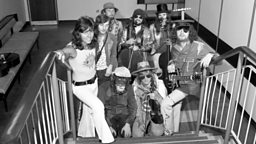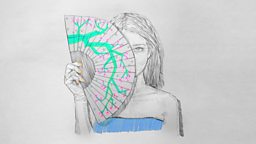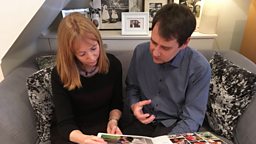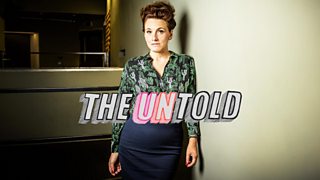Six real-life stories that help us reflect on grief
Grief is a deeply personal journey; there is no one, right way to mourn the death of a loved one. But hearing accounts from others who have been through the process of loss, learning how their grief manifested itself, and how they found meaning in the darkest of moments, can bring comfort to us as we go through our own bereavements.
Here are six programmes which, in their own unique way, provide reflections on grief and the myriad of ways in which we experience it.
The Listening Service - Music for Mourning

In this episode of The Listening Service, Tom Service explores the music of grief and asks, why do we need music to mourn? All over the world, music has always been a crucial part of bereavement, from the most ancient human societies to our own modern times. We play music at funerals to celebrate a person’s life, and we find significant songs with which to remember our loved one. Music is so often the bridge we build from this world to the next.
Music is so often the bridge we build from this world to the next
With the help of cognitive neuropsychologist Catherine Loveday, Tom compares the music of two royal funerals separated by three centuries. By tracing the development of funeral music into abstract art music he uncovers the private grief behind Bach's great D-minor violin Chaconne. And, before ending with a Top Ten countdown of today's funeral favourites, he ponders why some music, never intended to be mournful, becomes indelibly associated with grieving.
Soul Music - Mr Blue Sky

Soul Music explores pieces of music with a powerful emotional impact. This episode looks at ELO's brilliantly off-beam classic, Mr Blue Sky, and how, for one grieving family, it became an anthem.
Tracey Collinson’s husband Nigel loved the track, and it perfectly reflected his personality. “You can’t help but bring yourself up a little bit taller when it starts to play; you can’t help but smile,” says Tracey. “That was Nige through and through.” In 2013, Nigel was diagnosed with cancer of the oesophagus and died just twelve weeks later. But rather than let grief take over, Tracey used ELO’s hit to celebrate her husband’s life. On the night he passed away, they played the song at full volume as he was carried from the house. At his funeral, to help the hundreds of guests feel grateful for the joy Nigel had brought them, they printed the song in the order of service and had it blast out as the congregation left the church. “The sky was blue,” she recalls. “It was a beautiful, beautiful, stunningly blue sky. And it was going to be no other way.”
Soul Music - Hallelujah

As Soul Music explores, Leonard Cohen’s Hallelujah has a profound meaning for many – including Jim Kullander, who made a connection with the track after the death of his wife.
What love does is it just shatters you. Just breaks you apart. And that鈥檚 not a bad thing
Jim and Wanda married in 1984. They had agreed not to have children but as the years passed, Wanda had second thoughts and the couple separated. But, when Wanda was diagnosed with stage four ovarian cancer, it was Jim who would spend the nights with her as she lay in her hospital bed at home. And he was there when she passed away. A friend gave him a K.D. Lang album, which featured Hallelujah. And, after the experience of seeing Wanda through her final months, the song struck a chord with him. It “embraces the whole mess of what love is,” says Jim. “What love does is it just shatters you. Just breaks you apart. And that’s not a bad thing.”
The Untold 鈥� Carry on Coxing

The Untold, a series presented by Grace Dent, documents the untold dramas of 21st-century Britain. In Carry on Coxing, Grace looks at the tale of 77-year-old widower, Paddy Davison, who coxes a women's rowing eight while coping with the death of his wife.
Paddy is possibly the oldest rowing coxswain in the country. He's also never rowed a stroke in his life, and only discovered the sport five years ago. Despite the late start, he commands a crew of eight ladies at the City of Bristol Rowing Club and is desperately hoping for success at this year's Henley Women's Regatta. But this isn't really a story of a rowing race. This is a tale of recovery from grief, and how teamwork and friendship can be a powerful salve. When Paddy lost his wife, Jules, in sudden and unexpected circumstances it knocked him for six. But his “rowing girls” have been there for him, and are helping him get his life back on track.
A Bright Yellow Light

Three years ago, successful businessman Nadim Ednan-Laperouse was on a flight with his daughter Natasha when she suffered a severe allergic reaction to a Pret a Manger sandwich and tragically died on the aeroplane floor. The story of what happened has been widely reported and touched many people, and it led to the introduction of “Natasha's Law” following a successful court ruling. But, although it was a big news story at the time, Nadim has never told of the extraordinary religious experience that happened to him on the plane that day.
In A Bright Yellow Light, Nadim opens up about how, as he watched Natasha dying, five angels appeared in front of him. And, as they moved around his daughter, she lost her battle to survive. Nadim had been an atheist up to this point but, in that moment, he found faith. He believes they were there as guardians, with a mission and a purpose. “God sent the angels,” says Nadim. “For me to see, and to tell me it’s ok.”
Word of Mouth - The Language of Bereavement and Grief

In Word of Mouth, writer Michael Rosen explores the language of bereavement and grief as he talks to psychologists, teachers, and hospice workers.
Michael visits Winston’s Wish, a charity for children who have lost a parent, brother or sister, and sits in on a training session for teachers and carers. He discovers how the language we use can either confuse or comfort young children. When used well, it can help them to understand that death is a permanent state, and it can give them an outlet and a way to express their emotions.
Michael also talks to psychologist Colin Murray Parkes about the stages of grieving and the psychological complexity of dealing with loss. And he visits a Death Cafe, where like-minded people come together to discuss anything and everything about death and dying, whilst enjoying tea and cake.









